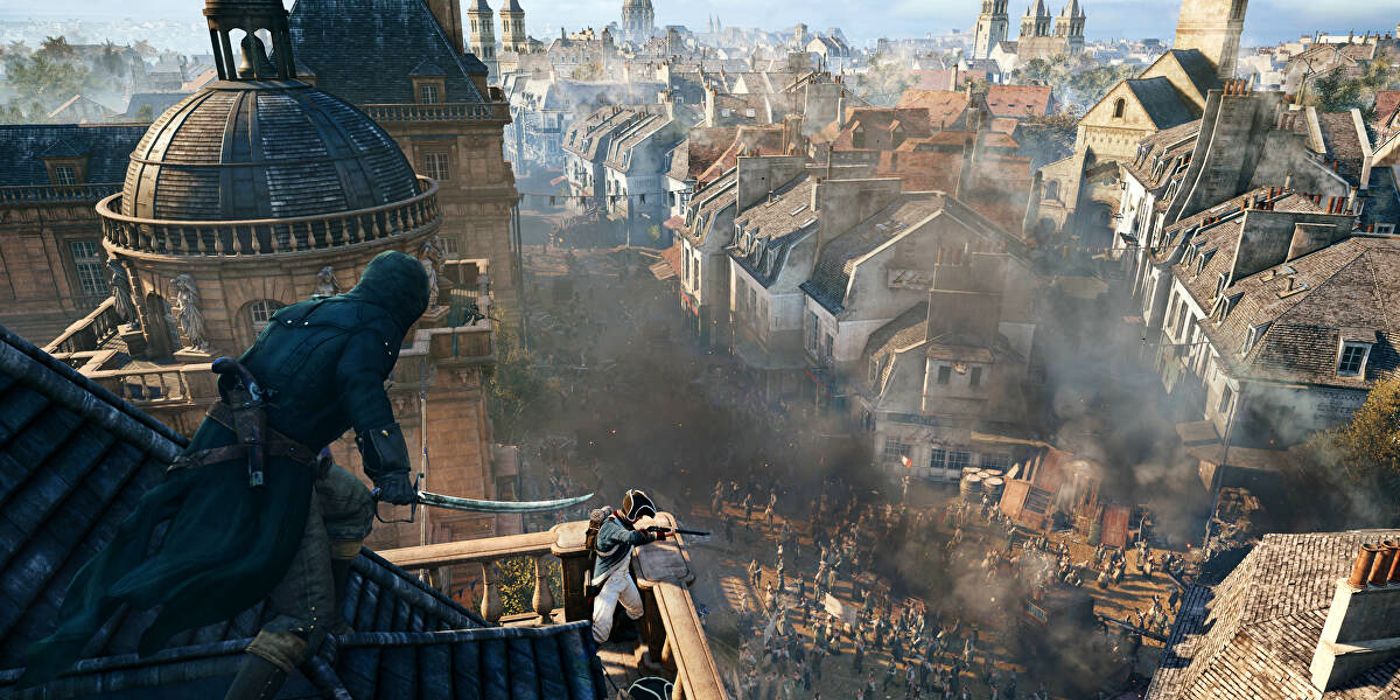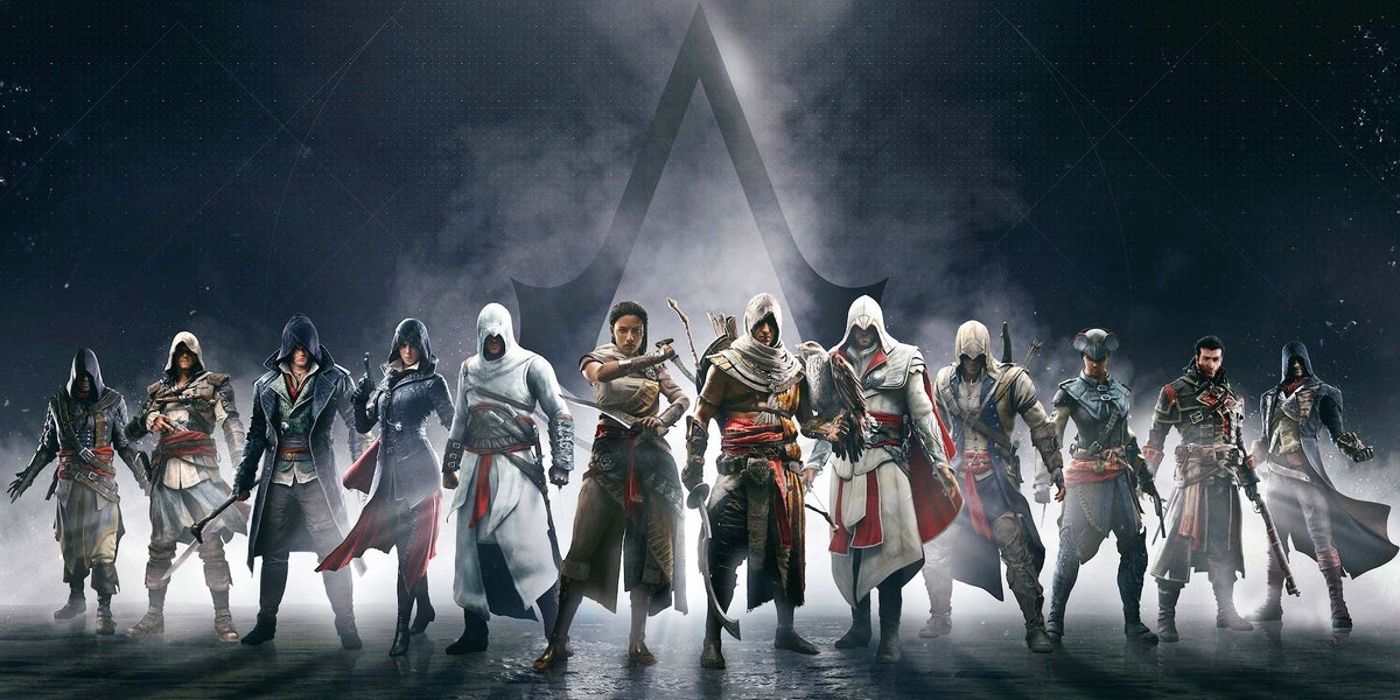The backlash received from Assasin's Creed Unity taught Ubisoft many lessons for its future installments to the popular franchise, yet it appears the wrong lessons have been learned. Recent rumors point to Assassin's Creed Infinity releasing in 2022, while Assassin's Creed Valhalla is still being supported two years after its launch. However, even with these new releases, there's an underlying problem with the popular series that may have started with Unity.
Assassin's Creed Unity is set during the French Revolution and sees players take the role of Arno, a young man who embarks upon an extraordinary journey to expose the true powers behind the Revolution. Unity retains the series' third-person open-world exploration while introducing revamped combat, parkour, and stealth systems. Unity was also well regarded for its cooperative multiplayer, allowing up to four players to engage in narrative-driven missions and explore the open world map. However, according to fans, Ubisoft's 2014 release may just have been one of the worst games in the Assassin's Creed series and may have contributed to the change in its direction.
The list of issues for Assassin's Creed Unity is shockingly long, leaving a lasting impression on the fans of this long-running stealth-orientated series. From game-breaking bugs and glitches, the abundance of characters with a British accent despite the French setting, to lackluster storylines and unfavorable characters, Unity has a permanent stain to its name. After receiving so much backlash from this title, perhaps Ubisoft learned some valuable lessons on how to improve the series as a whole. Unfortunately, Ubisoft seems to be getting things completely wrong instead of capitalizing on what made the series so great to begin with.
The Removal Of Cooperative Multiplayer In Assassin's Creed
While the series is known for in-depth storytelling, epic combat, and remarkable character feats such as jumping off of the tallest buildings, Assassin's Creed Unity had the undisputed positive of allowing players to embark on narratively-driven story missions in its co-op experience. This sparked a change in the formula of Assasin's Creed as it was no longer exclusively single-player. Despite its many flaws, cooperative multiplayer was one of the saving graces for Unity, as previously fans were unable to play Assasin's Creed with others. Unfortunately, this new development was short-lived.
Outside the Wolfpack multiplayer game mode found in Assassin's Creed 3 and Black Flag, which was in its PvP mode as training only, the only game to ever include co-op was Assassin's Creed Unity. Ubisoft has seemingly abandoned the idea of allowing players to progress through the intricate stories of the popular series with other players, which is disappointing for those who do not want to play games on their own. Assasin's Creed Odessy had the biggest map in the series, but the lack of cooperative play was a major missed opportunity, especially when games like Destiny and The Division 2 allow players to explore vast open worlds together. The exclusion of such a feature in the recent Assasin's Creed games feels strange and out of place, especially since they have the potential to provide a unique multiplayer experience that fans may enjoy.
Assassin's Creed Is Another Generic Open-World RPG Series
Open-world RPG titles like Genshin Impact, Elden Ring, and World of Warcraft are all massively successful titles that have millions of players online daily. With the already existing open-world aspect of Assassin's Creed, there was only a matter of time before the series slowly began to incorporate more elements from the popular role-playing genre. However, the drastic shift took the franchise away from its roots with worrisome RPG elements being included through to Valhalla. Again, this is another change that was influenced by the negative reception of the series since Unity.
Assassin's Creed Syndicate continued the series' beautiful, authentic worlds and deep storytelling, whilst keeping the stealth-orientated combat and emphasizing smart movement and tactics. However, Syndicate left Assassin's Creed as an action series, then emerged from its two-year hibernation as an RPG in The Witcher 3 mold, complete with leveling, skill trees, an extensive loot system, and crafting. While some may welcome this change, others argue that Assassin's Creed has abandoned its roots to instead appeal to a wider audience. However, one more major decision by Ubisoft might just be one of the most detrimental to the series' new releases.
Assassin's Creed Games Need More Development Time
While Valhalla is praised for its stunning scenery and creative combat mechanics, the game is also known for its incredibly rough launch and game-breaking bugs that plagued the title for a whole four months. Ubisoft quickly sent out a major Valhalla patch that fixed over 100 bugs, a development eerily similar to that of Unity which was also plagued with glitches in the midst of its launch. Origins fell to the same fate, launching with audio-less, glitching cutscenes and unresponsive combat controls. This begs the question of whether or not the current development times for Assassin's Creed titles are enough.
Crunch time is all too familiar within the world of game development, and as the deadline for a project edges closer and closer, more pressure is put on teams to complete the game and get it ready for launch. Assassin's Creed is a special case when it comes to releases, as they are often irregular, but there are usually no more than 3 years between each release. Unfortunately, despite the long development time of some of these titles, many have still been released with the game not working as intended. The obvious solution to solve such problems- that the next Assassin's Creed must avoid- could be as simple as increasing the development time of each game by another year. Giving the development team another year to identify and resolve in-game issues, and greatly reduce the stress that comes with releasing a game that is plagued with such problems, could benefit the series greatly. Unfortunately, Ubisoft is yet to green-light the decision and instead wants to pump out its games as frequently as possible at the cost of the game's quality.
Assasins's Creed is a series beloved by its dedicated fanbase, eagerly attempting to push the series further in Ubisoft's quest to innovate and evolve one of its most recognizable franchises. While each release aims higher than the last, it's becoming more apparent that the series strives further from the original formula that made Assasins's Creed popular in the first place. Assassin's Creed Infinity is reportedly set in Japan, but this information is not concrete and nothing is known about whether the game will abandon its role-playing aspects in favor of a more action-adventure experience in line with the original titles. For now, players will have to wait till the game drops to find out if Ubisoft has finally learned from the mistakes made in Assassin's Creed Unity and its other past titles.




